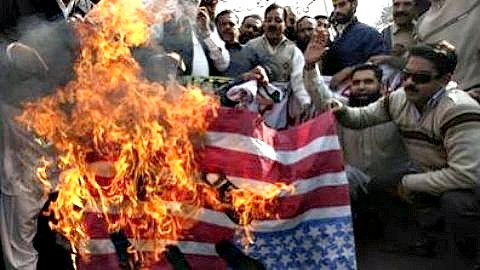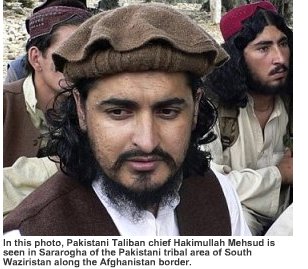Archives
AND MORE...

Council of Fools
____________________

Excuses, Excuses
____________________

Spies Caught
____________________

Holy Nukes
_____________________
December 4, 2011
Good Guys-Bad Guys
Here's the thing about Pakistan "experts" (like the one mentioned below), or so-called Western officials in the region who speak candidly, but only under the condition of anonymity: We have problems trusting anyone by the name of anonymous or unnamed, not to mention our own government, when it comes to telling the difference between (foreign) good guys and bad guys.
Not only is our record of choosing good guys-bad guys less than stellar (remember our former buds, the Taliban?), but we have an administration today that can't tell the difference between a longtime ally and sworn enemies.
Remember DNI Clapper's "largely secular" Muslim Brotherhood in Egypt? Those of us who warned against the MB were met with "don't worry, be happy; the Arab Spring is a-blossoming!" Well, that secular MB, the largest and most organized group in Egypt (which we also warned), has just won the elections in Egypt, so what will the "experts" say now? If it's anything less than gird your loins, 'cause we and our allies are in for a v-e-r-y bumpy ride, we'd ship 'em to Egypt for a year or two, to savor the fruits of the Arab Spring and sharia.
Now we're going to figure out who's who among the various factions of various insurgent groups operating in the various South/North/East/West regions of No-Man's-Land, Waziristan?! Based on what? Our intuition and deep understanding of Arab/Muslim culture? Anyone ever hear of Waziristan before the folks over there started breeding and exporting "insurgents"?
So to all our "senior officials": Stop trying to figure out who's who or what's what in duplicitous Pakistan, and focus publicly (as in all newspapers and TV news networks) on joint projects, joint cooperation, joint-whatevers with Pakistan's not-so-BFF, India, because if there's anything that scares the livin' daylights out of the Paks, it's India. Plus chances are the Indians are much better at telling the difference between the Mehsuds, Haqqanis, Taliban, et al of the region, than we are.
Meanwhile, our own national security/foreign policy message to everyone should be: Do what you will at home, but mess with us, or our allies, and you'll get what bleeding-heart Westerners call a DISPROPORTIONATE response.
American exceptionalism requires an exceptional Commander-in-Chief with the knowledge, wisdom and cajones to be Commander-in-Chief. Problem is America's presidential candidates, not to mention the American public's intuition and electoral record of late, don't even come close to satisfactory, much less exceptional...
Foxnews.com | December 4, 2011
Experts Claim Pakistani Taliban Splintering Into Factions
By Associated Press

Dec. 3, 2011: Pakistani workers burn a replica U.S. flag during a rally to condemn alleged NATO airstrikes on Pakistani troops. U.S. officials gave Pakistan soldiers the wrong
location when asking for clearance to attack militants along the border last weekend,
Pakistani military officials said Friday. The strike resulted in the deaths of 24 soldiers and
a major crisis in relations between Washington and Islamabad. AP
Battered by Pakistani military operations and U.S. drone strikes, the once-formidable Pakistani Taliban has splintered into more than 100 smaller factions, weakened and running short of cash, according to security officials, analysts and tribesmen from the insurgent heartland.
The group, allied with Al Qaeda and based in the northwest close to the Afghan border, has been behind much of the violence tearing apart Pakistan over the last 4 1/2 years. Known as the Tehrik-e-Taliban, or TTP, the Taliban want to oust the U.S.-backed government and install a hard-line Islamist regime. They also have international ambitions and trained the Pakistani-American who tried to detonate a car bomb in New York City's Times Square in 2010.
"Today, the command structure of the TTP is splintered, weak and divided and they are running out of money," said Mansur Mahsud, a senior researcher at the FATA (Federally Administered Tribal Area) Research Center. "In the bigger picture, this helps the army and the government because the Taliban are now divided."

The first signs of cracks within the Pakistani Taliban appeared after its leader, Baitullah Mehsud, was killed in a drone strike in August 2009, Mahsud said. Since then, the group has steadily deteriorated.
Set up in 2007, the Pakistani Taliban is an umbrella organization created to represent roughly 40 insurgent groups in the tribal belt plus Al Qaeda-linked groups headquartered in Pakistan's eastern Punjab province.
"In the different areas, leaders are making their own peace talks with the government," Mahsud added. "It could help the Pakistani government and military separate more leaders from the TTP and more foot soldiers from their commanders."
The two biggest factors hammering away at the Taliban's unity are U.S. drone strikes and Pakistani army operations in the tribal region.
Turf wars have flared as militants fleeing the Pakistani military operations have moved into territory controlled by other militants, sometimes sparking clashes between groups. And as leaders have been killed either by drones or the Pakistani army, lieutenants have fought among themselves over who will replace them.
"The disintegration ... has accelerated with the Pakistan military operation in South Waziristan and the drone attacks by the United States in North Waziristan," Mahsud said, referring to the two tribal agencies that are the heartland of the Pakistani Taliban.
Another factor is the divide-and-conquer strategy Pakistan's military has long employed in its dealings with militants. Commanders have broken away from the TTP and set up their own factions, weakening the organization. Battles have broken out among the breakaway factions, and in one particularly remote tribal region the TTP was thrown out. These growing signs of fissures among the disparate groups that make up the Pakistani Taliban indicate the military's strategy could be paying off.
That would explain the mixed signals this month coming out of the tribal belt, where some militants are mulling the idea of peace talks with the government, others are offering to stop fighting and still others are disavowing both peace and a cease-fire. It might also explain a steady decline in suicide attacks in Pakistan, according to the privately run Pak Institute for Peace Studies.
The U.S. is eager to see some benefits in neighboring Afghanistan, where its troops have come under attack from militants based across the border in Pakistan. NATO forces in Afghanistan are trying to break the back of the Afghan insurgency before the end of the U.S.-led coalition's combat mission in 2014.
There is no evidence so far that fissures within the militant structure in Pakistan are helping NATO and U.S. forces.
The deadly Haqqani network, which has bases both in Pakistan and Afghanistan and is affiliated with Al Qaeda, is one of the most lethal threats to coalition troops. It has long found safe haven in Pakistan's tribal belt and has used the Pakistani Taliban as a source of recruits. Senior U.S. officials say the Haqqanis also receive support from Pakistan's army and intelligence agency, a charge Islamabad denies.
Analysts predict that over time, however, the internecine feuding in the Pakistani Taliban will take a toll on militants fighting in Afghanistan, making it increasingly difficult for them to find recruits and restricting territory available to them.
Pakistan's military has rebuffed appeals from Washington to take on all of the insurgent groups in the tribal region, saying it has neither the men nor the weapons to do so. Instead, Islamabad has pushed its divide-and-conquer approach, which is gaining some traction in the United States, according to two Western officials in the region.
The officials say the success of this approach will be measured in Washington by its ability to curb Haqqani network attacks in Afghanistan. The officials requested to remain anonymous in order to speak candidly.
Cooperation between the U.S. and Pakistan suffered a serious setback a week ago when NATO aircraft killed 24 Pakistani soldiers at two border posts. The Nov. 26 incident seems certain to blunt any prospect of Pakistan taking direct steps to curb the Haqqani network, analysts say.
In the wake of the attack, intelligence sharing has stopped, military-to-military contact has been suspended, routes supplying non-lethal goods to NATO in Afghanistan have been shut, and Pakistan has withdrawn its offer to bring Taliban and representatives of the Haqqani network to the negotiating table.
Pakistan also announced it will boycott next month's conference in Bonn, Germany, to find ways to stabilize Afghanistan.
There is no independent figure on how many Taliban fighters operate in the tribal regions, but it is estimated to be in the thousands. There are upward of 130 groups in the area, Mahsud said, some of them small, violent offshoots of larger groups.
They have varying loyalties to a handful of key commanders like Hakimullah Mehsud, the current leader of the Pakistani Taliban.
Popular support dwindled for Mehsud after his group was driven out of South Waziristan by the military and relocated to North Waziristan, according to tribesmen in the area. They spoke to The Associated Press on condition of anonymity because they feared reprisals from militants.
The Pakistani army has brokered agreements with some Taliban factions, according to a senior Pakistani security official who spoke to The Associated Press on condition of anonymity to discuss the sensitive topic. But there are no peace talks under way with Mehsud, who has declared war on the state of Pakistan, the official said.
A brash and heavy-handed insurgent, Mehsud has killed former allies, defied orders from the Haqqani network's chief and developed close links with criminal gangs who kidnap, extort and exploit the local population.
He also has made enemies of former lieutenants in other parts of the tribal region, like neighboring Kurram Agency, where a deputy, Fazl Saeed Haqqani, split with Mehsud three months ago and formed his own Islami-Tehrik-e-Taliban group.
In yet another tribal region of Orakzai, where Mehsud once held sway, members of feuding groups are now killing one another.
Original article here.
Log In »
Notable Quotables
"Mr. Netanyahu is one of the most media-savvy politicians on the planet. On Friday he appeared live via video link on 'Real Time with Bill Maher,' taking the host’s alternately sardonic and serious line of questioning with gazelle-like alacrity."
~ Anthony Grant, jourrnalist who has written for many major newspapers and worked in television at Paris and Tel Aviv, interviewing former PM Benjamin Netanyahu on Monday, at the outset of Mr. Netanyahu's new book (more here).


